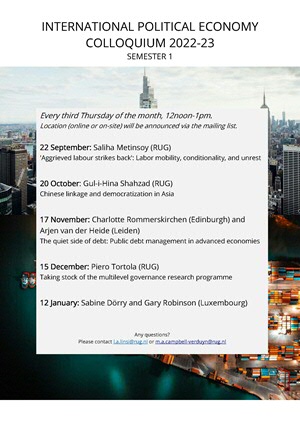CIRR-IPE colloquium - GARY ROBINSON, SABINE DÖRRY & BEN DERUDDER (Luxembourg): "Reform that you may preserve. SWIFT’s ‘nested relationalities’ and directed change in arbitrating global payments"
Research colloquium of the theme group International Political Economy.
Gary Robinson, Sabine Dörry & Ben Derudder (Luxembourg): "Reform that you may preserve. SWIFT’s ‘nested relationalities’ and directed change in arbitrating global payments"
Abstract
Crucial for international trade, payments are conducted via the correspondent banking (CB) system. The CB system is a decentralised network of bilateral agreements between more than 11,000 banks in different jurisdictions nested in a range of monetary spaces, and supported by a centralised messaging network (SWIFT). This global twin infrastructure is constituted by complex socio-technical and socio-spatial arrangements resistant to change. The global payment infrastructure is constituted by and for key members in cross-border payments, in which transaction banking is a key service. Analytical frameworks of innovation and change fail to grasp the essence of financial infrastructures that feature simultaneous cooperation and competition between and among challengers and incumbents, and lack overall central governance organised across scales. The new wave of digital technologies and the challenging business models roughly denoted by the rise of FinTech, however, make change inevitable. Beset by inefficiencies, from which the gatekeeping incumbent banks profit, the international payments system lacked alternatives until the recent tech’s threat of disintermediation and reorganisation of originally serial banking chains to ‘big data arrangements’. We show that the CB/SWIFT nexus is an integral part of the financial and advanced services providers (FABS) complex, and, as such, also a specific part of obligatory passage points (OPPs) argued to create (and defend the creation of) difference to arbitrate and extract monopoly rents. Challenged by new technology, it makes understanding and conceptualising change in and of OPPs vital. The approach of relational power geometries helps to grasp complex relationships between intermediaries of the FABS complex, thereby shifting, as we argue, to new, forward-looking sources of rent extraction to preserve enabling rent-extracting conditions.
Registration
Register and/or sign up to the IPE mailing list by sending an email to Lukas Linsi (l.a.linsi rug.nl) or Malcolm Campbell-Verduyn (m.a.campbell-verduyn rug.nl).

